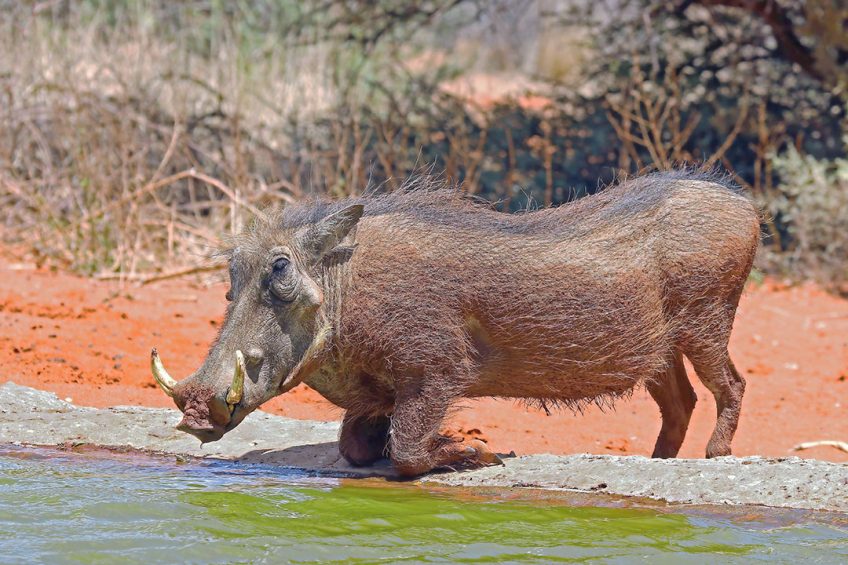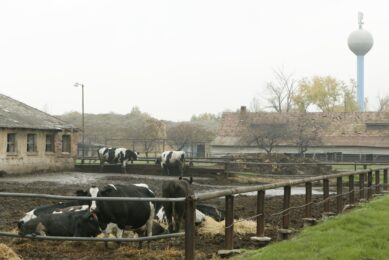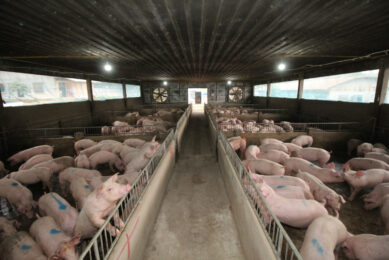Warthog microbiota for partial protection against ASFv

A Spanish study has shown that faecal microbiota transplantation can help to confer partial protection against African Swine Fever virus (ASFv).
The study, carried out by researchers of the Catalan research centre CReSA-IRTA, was published in the peer-reviewed journal Scientific Reports, a publication by Nature. The article demonstrates that a warthog faecal microbiota transplant is not harmful for domestic weaned piglets, while it modifies their gut microbiota. Also, a treatment from warthogs to pigs confers partial protection against attenuated ASFv strains.
Subclinical infection by ASFv in warthogs
The article pointed to the fact that in warthogs (Phacochoerus africanus), African Swine Fever virus circulates “only” in a subclinical manner – and how that can be explained, seeing that the virus causes 100% mortality in domestic pigs and wild boar in Europe.
The researchers wrote: “Together with genetic differences, other factors might be involved in the differential susceptibility to ASF observed among Eurasian suids and African warthogs.” They stated that preliminary evidence obtained in the CReSA-IRTA laboratory and others, seemed to confirm the effect that environmental factors might have on ASF infection.
Does a microbiota transplantation make a difference?
Explaining the “why” behind the research, they referred to the fact that a faecal microbiota transplantation has proven beneficial in the treatment of human and animal viral diseases, chronic liver diseases, ulcerative colitis and to fight multi-resistant Clostridium difficile infections in humans.
The trials were conducted with 48 piglets, acquired from a farm free from PRRSv, Aujeszky’s Disease (pseudorabies), Pasteurella multocida and Brachyspira hyodysenteriae. All the animals were orally inoculated during 3 consecutive days with freshly prepared faecal material from either warthog faeces, a pool of domestic faeces or a control group. The warthog faeces was obtained from a colony of 11 warthogs from Barcelona zoo.

Track the movement of African Swine Fever
For everything you need to know about ASF, from the latest outbreaks to controls stay up to-date…
Challenging with ASFv strains
After the faecal transplantation, they were challenged with a virulent or an attenuated ASFv strain to compare disease outcomes, the researchers wrote. No differences were observed after intramuscular challenging with E75, a virulent ASFv strain, independently of the faecal microbiota transplantation. “Conversely, a very significant reduction of virus in serum, nasal viral shedding and clinical signs were observed when pigs transplanted with warthog faeces were intramuscularly challenged with E75CV1, an attenuated ASFv strain, when compared with pigs transplanted with domestic pig faeces. Far from understanding the mechanisms involved in the protection afforded, we provide here evidences showing the protective potential to ASF of warthog microbiota.”

More research from CReSA-IRTA: How infectious is ASFv?
Pig faecal samples from various origins
It is not the first time the time has delved into this topic. A recent article on the CReSA-IRTA website highlighted the previous work paving the way for the current study.
To figure out what the difference might be between the faecal composition of African warthogs and other types of pigs, that research from 2019 by CReSA-IRTA analysed faecal samples from various origins:
- European farms;
- African backyard farms;
- Wild warthogs from Kenya;
- Warthogs in Barcelona Zoo; and
- A specific-pathogen-free (SPF) farm in France.
After DNA extraction, it was found that the diversity in the faecal microbiota of SPF pigs was the lowest of the groups. Similarly, the number of different taxa composing the microbiota of captive warthogs (richness) was similar to the microbiota of SPF pigs, demonstrating the importance of the environment the animals are raised.

Also from CReSA-IRTA: Probiotics to overcome Glässer’s Disease
When the total bacterial composition was compared the team found that pigs have a similar composition no matter if they came from African backyard or a European farm. SPF pigs had a very dissimilar composition and African warthogs showed the most heterogenous microbiota from all the pigs analysed.
Bacteria candidates identified
When the team compared the microbiota composition of animals susceptible against resistance, several bacteria candidates were identified. In total 6 members from different taxa were exclusively present in resistant animals: bacteria from Moraxellaceae family, Pseudomonadales order and Paludibacter, Anaerolplasma, Petrimonas and Moraxella genera.
The latest research paper in Scientific Reports was authored by Jinya Zhang, Fernando Rodríguez, Maria Jesus Navas, Mar Costa-Hurtado, Laia Bosch-Camós, Elisabeth López, Raul Cuadrado, Francesc Accensi, Sonia Pina-Pedrero, Jorge Martínez and Florencia Correa-Fiz, CReSA-IRTA, Bellaterra, Barcelona, Spain; and Vanessa Almagro, Veterinary Service Zoo, Barcelona, Spain.











